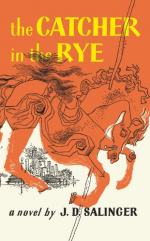|
This section contains 555 words (approx. 2 pages at 300 words per page) |

|
Psychological Anaylsis of Holden
Summary: A psychological analysis of Holden Caulfield from J.D. Salinger's novel Catcher in the Rye, focusing on the impact of the death of Holden's brother Allie on Holden's inability to mature.
Throughout J.D. Salinger's The Catcher in the Rye, the protagonist Holden Caulfield struggles to let go of his adolescence. Chapter five, in particular, epitomizes this shortcoming. As Holden strains to create a composition for his roommate, the memory of his brother's death hinders his capability to appropriately complete the assignment. Holden's inability to mature stems from the aversive psychological imprint that remains after his brother Allie's death.
In 1900, Sigmund Freud developed the psychoanalytic school of psychology, which asserts that behavior comes from unconscious drives and conflicts. This theory conveys that the subliminal conflicts remaining from Allie's death initiate Holden's incapacity to mature. According to Freudian psychology, Holden's unconscious holds undesirable thoughts, wishes, memories and feelings causing him to act immaturely. Holden outwardly appears juvenile, yet in reality he suppresses his own intelligence because subconsciously Holden fears that he cannot live up to his, "terrifically intelligent," brother (Salinger...
|
This section contains 555 words (approx. 2 pages at 300 words per page) |

|


